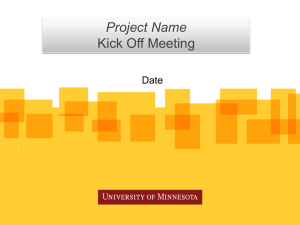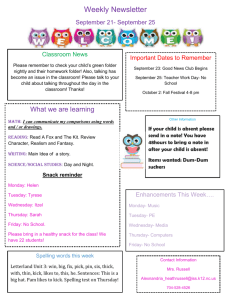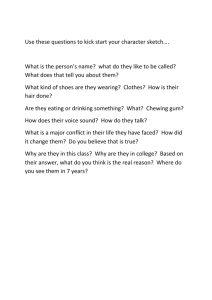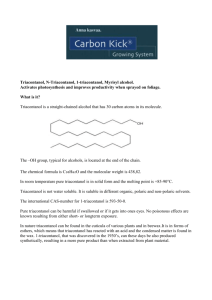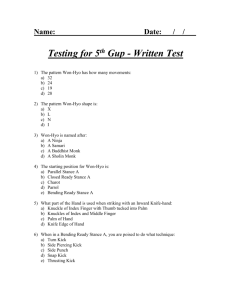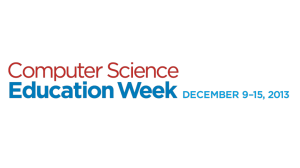Evolution Dailies
advertisement
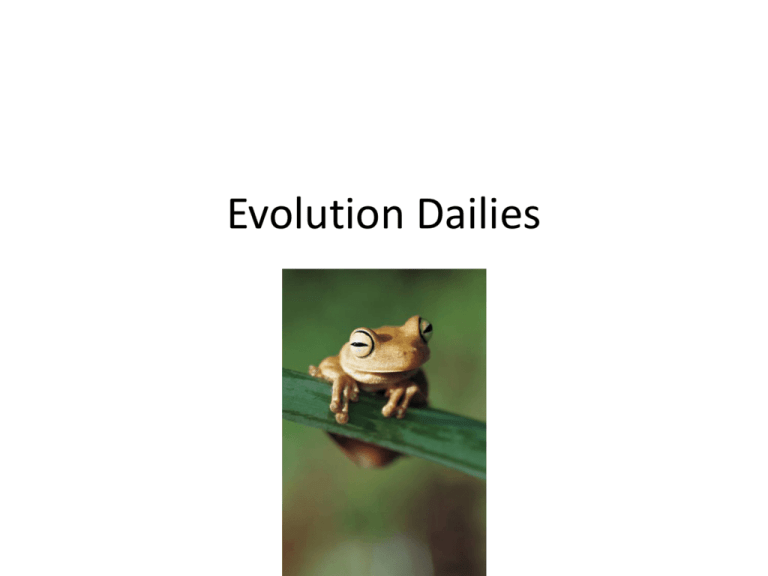
Evolution Dailies April 27 1. Kick off Question: What is the difference between the manipulated variable and the responding variable? 2. Natural Selection Research—make sure to turn in your project by Tuesday May 1 3. Geological time scale Learning Log: What is the geological time scale? April 25/26 1. Kick off Question: What are the two parts to a hypothesis? 2. Natural Selection Research—make sure to turn in your project by Tuesday May 1 3. Reading from book with Questions 4. Video: The human family tree Learning Log: What was one important point from the film? April 23/24 1. Kick off Question: What should you include in a conclusion 2. Lab: Bird Beaks day 4: the final report: Library if not done 3. Evolution game and Natural Selection Research 4. Reading from book with Questions Learning Log: What did you learn from the game? April 19/20 1. Kick off Question: Name the parts of a scientific investigation 2. Lab: Bird Beaks day 3: the final report: Library 3. Back in class –review of other students work Learning Log: Describe what you found out from your lab, what does your data mean? April 17/18 1. Kick off Question: Describe in a paragraph what you are going to do in the Bird Beak Lab 2. Lab: Bird Beaks day 2: recording data 3. Video The Human Family Tree 1. You will be writing a reflection paper so take notes on the video and any class discussions Learning Log: Describe what you found out from your lab, what does your data mean? April 13/16 1. Kick off Question: What do we mean when we say “survival of the fittest?” 2. Lab: Bird Beaks Learning Log: define the terms: Specialist Predator/prey Relationship Simulation Variation Advantageous (Beneficial) Characteristics April 11/12 1. Kick off Question: Describe how a scientist might use absolute and relative dating to determine the age of a fossil. 2. Lab: Who will survive? Learning Log: What determines “who” will survive? April 9/10 1. Kick off Question: What are some difficulties with using fossils to tell us about the past? 2. Clocks in Rocks: Radioactive dating Learning Log: What is radioactive dating? March 29 1. Kick off Question: Explain how fossils are formed? (step by step including what type of rock) 2. Gifts of the past complete and turn in Learning Log: What is the Law of Superposition? March 26 1. Kick off Question: Write a paragraph on the ways that you think that scientists figure out the age of events in earth’s history and when organisms first appeared. 2. 12:30 up to the library 3. Gifts of the past Learning Log: How are fossils formed? What type of rock are they formed in? March 23 1. Kick off Question: Describe Natural Selection in a paragraph. 2. Quiz-see what you know so far 3. Video: What Darwin Never Knew 4. Turn in Questions sheet at end of period 5. If time: Clocks and Rocks Penny Lab Learning Log: What were some more things Darwin didn’t know? March 22 1. Kick off Question: Describe Natural Selection in a paragraph. 2. Quiz-see what you know so far 3. Video: What Darwin Never Knew 4. Turn in Questions sheet at end of period 5. If time: Clocks and Rocks Penny Lab Learning Log: What were some more things Darwin didn’t know? March 20 1. Kick off Question: Do we use similarities or differences more in classifying animals? Why do you think so. 2. Video: What Darwin Never Knew 3. Turn in Questions sheet at end of period Learning Log: What were some things Darwin didn’t know? March 16/19 1. Kick off Question: Why is variation in an animal species good? 2. Toothpick fish finish and turn in 3. Unity and diversity Learning Log: How do we differentiate different groups of animals March 14/15 1. Kick off Question: How might mutations in the genetic code cause changes over time to a species of animals? 2. Toothpick fish finish and turn in 3. If time start Unity and diversity 1. Learning Log: Explain Natural Selection now that you have a better idea. March 12 1. Discuss the importance of weekly lifeline and Table of Contents. 2. Refocus on rules 3. Kick off Question; What are your goals for this trimester 4. Anticipation guide 5. Toothpick fish 6. Learning Log: Explain Natural Selection
